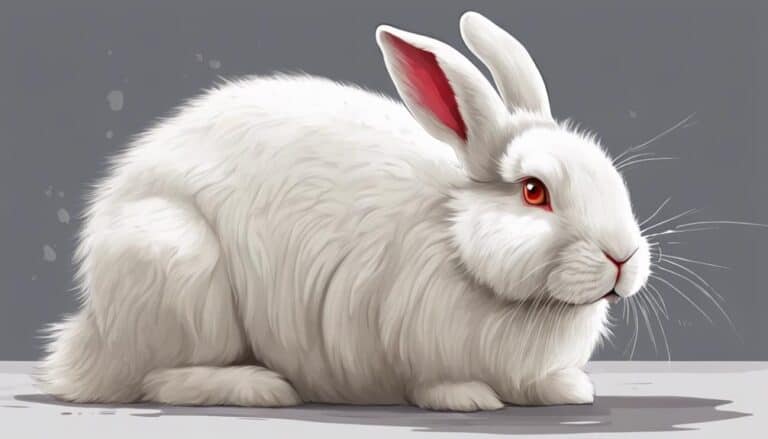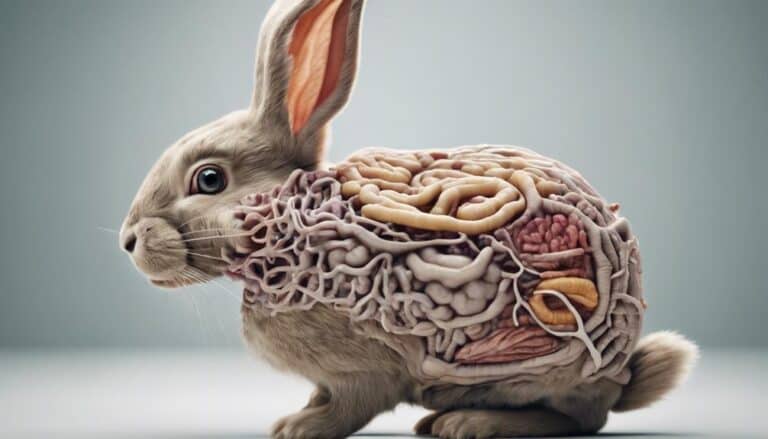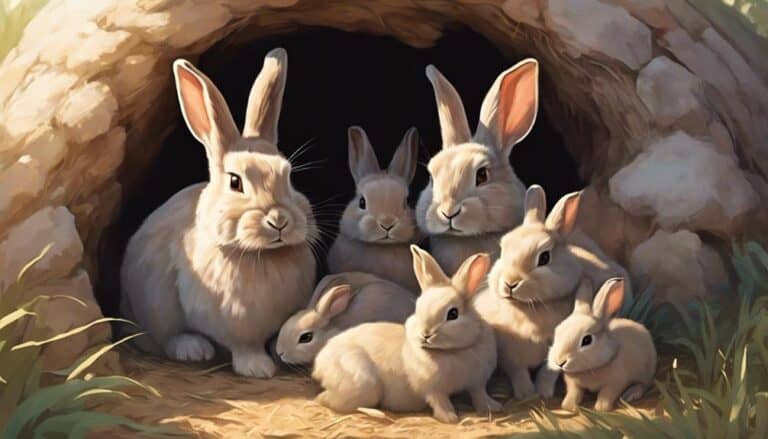Imagine a fluffy bunny nibbling on a tiny grain of rice, but should they be munching on a full bowl of it?
While the image may seem adorable, the reality is not as cute. Rice can pose risks to your furry friend's health that you may not have considered.
Let's explore the potential consequences of including rice in your bunny's diet and why it might not be the best choice for their well-being.
Contents
Key Takeaways
- Rice poses digestive risks like cramps and bloating for rabbits.
- Low fiber content in rice can lead to GI issues.
- Rice consumption can create a nutritional imbalance in rabbits.
- Opt for diets supporting rabbit's digestive health to avoid risks.
Rice in a Rabbit's Diet
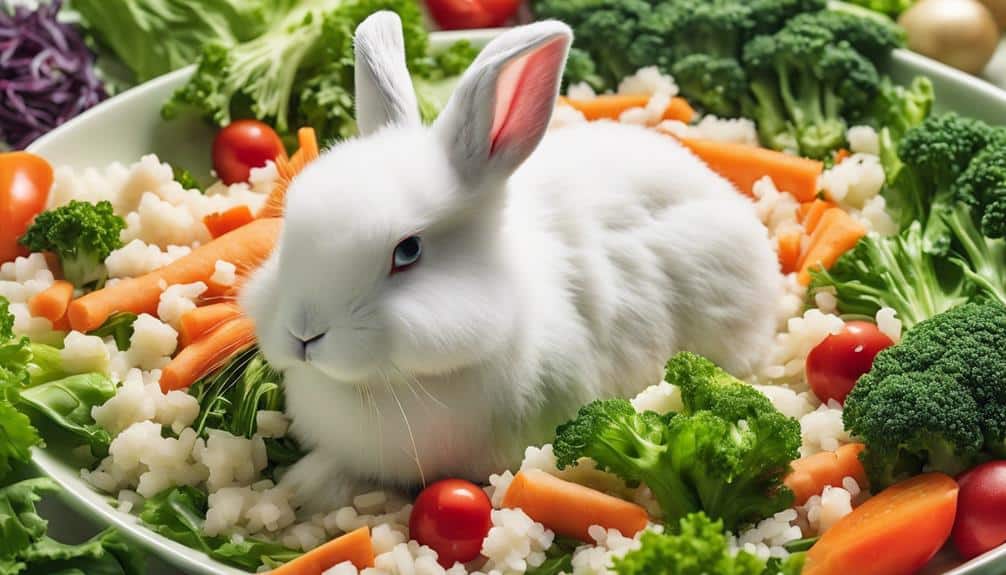
When considering the role of rice in a rabbit's diet, it becomes evident that its low fiber content poses significant risks to their digestive health. Rabbits, being herbivores, require a high-fiber diet to maintain peak digestive function. Rice, especially white rice, lacks the necessary fiber content essential for a rabbit's digestion.
Consuming rice can lead to stomach issues such as cramps, bloating, and gastrointestinal stasis in rabbits. Due to their delicate digestive systems, rabbits should primarily consume raw foods to aid in proper digestion. Cooked rice, with its high carbohydrate and calorie content, can cause digestive disturbances if regularly included in a rabbit's diet.
It's important to monitor rabbits for any signs of distress following rice consumption to ensure their health and well-being. Opting for high-fiber alternatives will better serve rabbits in maintaining a healthy digestive system and overall well-being.
Risks of Feeding Rice to Rabbits
Feeding rice to your rabbit can lead to digestive issues like stomach cramps, bloating, and potentially serious conditions such as GI stasis.
There's a risk of potential choking hazards due to the texture of rice, which can be harmful to your bunny's delicate digestive system.
Additionally, the lack of essential nutrients in rice could create a nutritional imbalance in your rabbit's diet, impacting their overall health negatively.
Digestive Issues in Rabbits
Rice poses a significant risk to rabbits' digestive health due to its potential to cause stomach cramps, bloating, and gastrointestinal stasis. The high carbohydrate and calorie content in rice can lead to digestive issues in rabbits, as it is low in fiber essential for their digestive system. Feeding rice to rabbits may result in discomfort and digestive disturbances, requiring careful monitoring for any signs of distress post-consumption. To provide a clearer perspective, here is a table outlining the digestive issues rice can cause in rabbits:
| Digestive Issues Caused by Rice |
|---|
| Stomach Cramps |
| Bloating |
| Gastrointestinal Stasis |
Potential Choking Hazards
Avoiding rice in a rabbit's diet is essential to prevent potential choking hazards and digestive complications. Rabbits eat rice, but this food is high in carbohydrates and lacks the necessary fiber content for their digestive health. The risk of choking is increased as rabbits may struggle to pass rice through their system.
Due to the low fiber content, rice can lead to blockages and digestive issues in your pet. Regular consumption of rice elevates the chances of choking incidents in rabbits. To guarantee your rabbit's well-being, it's important to avoid feeding them rice and opt for a diet that supports their digestive system to prevent any potential choking hazards.
Nutritional Imbalance Concerns
To maintain your rabbit's prime health, it's important to be mindful of the nutritional imbalance concerns associated with including rice in their diet. Rabbits require a diet rich in fiber to support their digestive system. Rice, lacking essential fiber, can lead to gastrointestinal issues such as GI stasis.
Additionally, the high carbohydrate content in rice poses a risk of obesity in rabbits if consumed regularly. Excessive rice intake can strain your rabbit's organs, potentially resulting in health problems. Risks like insulin spikes and digestive disturbances highlight the significance of moderation and awareness when considering adding rice to your rabbit's diet.
Ensuring a well-balanced diet is vital to prevent nutritional imbalances and uphold your rabbit's overall well-being.
Cooked Rice and Rabbits
After consuming cooked rice, rabbits may experience digestive issues that can lead to serious health problems. While rabbits can eat a variety of vegetables and hay, rice isn't a suitable food for them. Cooked rice lacks the essential nutrients that rabbits need and can disrupt their digestion, causing stomach cramps, bloating, and potentially gastrointestinal stasis.
If your pet rabbit happens to consume rice, it's important to provide an ample amount of hay and water to help with digestion. Rabbits may be curious and try rice if it's present in their food bowl, but it shouldn't be a regular part of their diet. Monitor your rabbit closely for any signs of distress after consuming rice, such as a decreased appetite or unusual behavior.
Remember to prioritize your rabbit's health by offering them a balanced diet rich in fiber and essential nutrients to keep them happy and healthy.
Uncooked Rice: Safe or Not?
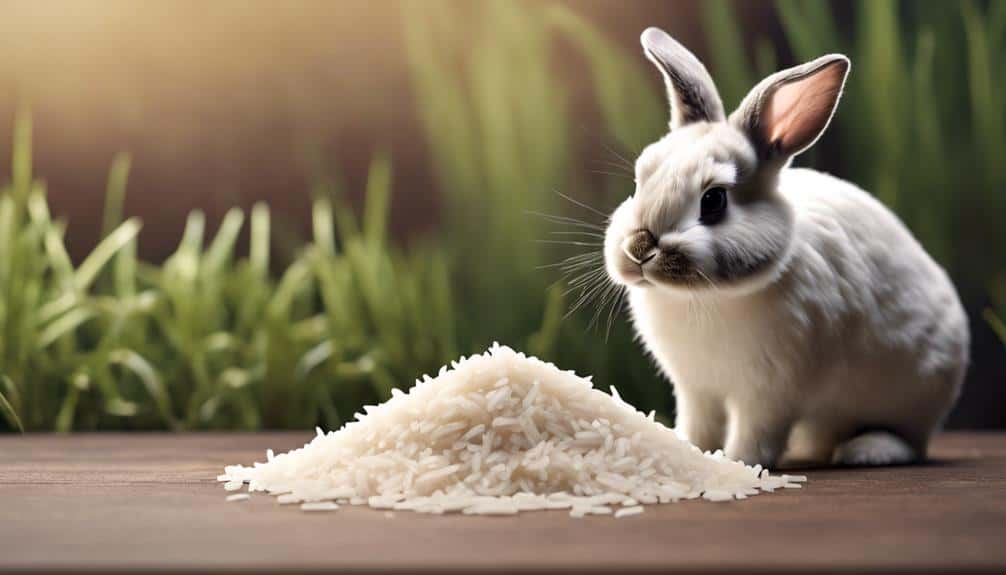
Uncooked rice poses a significant risk to your rabbit's health by potentially causing stomach distension. Rabbits lack the digestive capability needed to process uncooked rice, leading to discomfort and digestive disturbances.
Uncooked Rice Risks
Consuming uncooked rice poses significant risks to rabbits, potentially leading to severe digestive complications and discomfort. Rabbits are unable to digest uncooked rice efficiently, which can cause swelling in their stomach and lead to stomach distension. This can result in digestive issues such as bloating, cramps, and gastrointestinal stasis.
Due to the lack of nutritional value in uncooked rice and the potential discomfort it can cause, it's advisable to avoid feeding rabbits uncooked rice. Symptoms of rice ingestion in rabbits may include diarrhea, vomiting, and irregular bowel movements.
It's important to closely monitor rabbits for any adverse reactions or signs of distress after consuming uncooked rice to guarantee their well-being and health.
Raw Rice Dangers
When considering the diet of rabbits, it's important to understand the potential dangers associated with feeding them raw rice.
- Uncooked rice poses a risk of swelling in a rabbit's stomach, leading to severe stomach distension.
- Consumption of uncooked rice can result in symptoms like diarrhea, vomiting, and bowel movement issues in rabbits.
- Rice, especially white rice, lacks the necessary fiber for a rabbit's digestive system, causing potential digestive disturbances.
Feeding rabbits uncooked rice can lead to discomfort and digestive problems due to its lack of fiber and potential for stomach swelling. It's best to avoid including raw rice in a rabbit's diet to prevent digestive issues and guarantee their well-being.
Rice Krispies for Bunnies
Rice Krispies can be a suitable occasional treat for bunnies, as long as they're low in sugar and free from added marshmallows or extra sugars. When offering Rice Krispies to your rabbits, remember to do so in small amounts to prevent any potential health issues. It's important to avoid overfeeding them with cereals, including Rice Krispies, as this can lead to problems such as weight gain and tooth decay.
When selecting cereals for your rabbits, opt for varieties made from puffed oats or rice. However, it's vital to steer clear of those that contain nuts, as they can be harmful to your bunny's digestive system. Additionally, refrain from giving rabbits milk along with cereals like Rice Krispies, as they're lactose intolerant animals.
White Rice and Rabbit Health
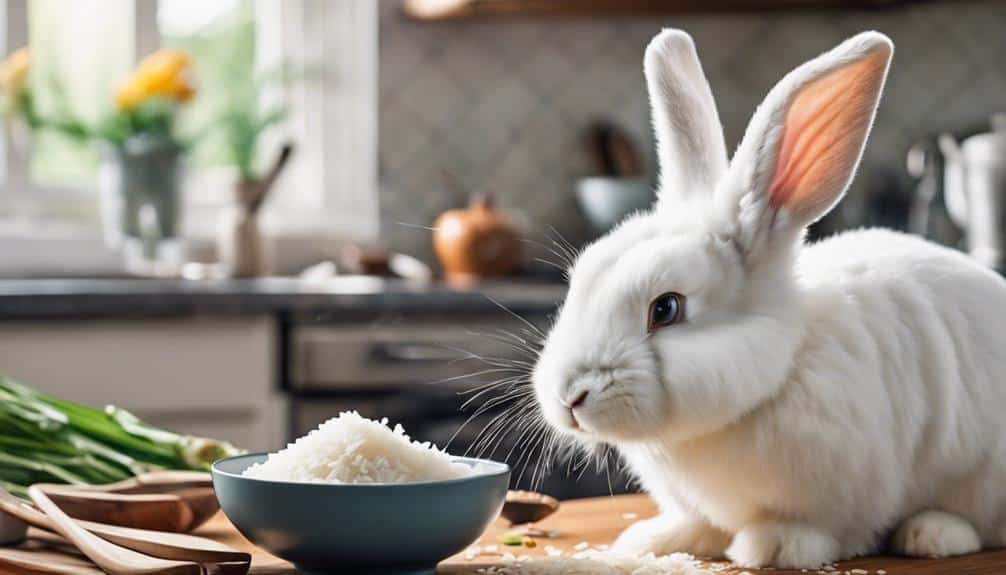
From Rice Krispies as a potential treat option, it's important to ponder the impact of white rice on a rabbit's health. When a rabbit ate white rice, it might lead to various health issues. Here are some important points to ponder:
- Lacks Essential Fiber: White rice lacks the necessary fiber required for proper digestion in rabbits, potentially causing digestive disturbances.
- Insulin Spikes: Consumption of white rice can lead to insulin spikes in rabbits, impacting their overall health and well-being.
- Digestive Strain: White rice consumption may result in digestive issues such as bloating and strain on a rabbit's delicate digestive organs.
It's crucial to be cautious when offering white rice to rabbits as it can disrupt their digestive system and lead to severe health complications. Monitoring your rabbit's stool changes after consuming white rice is important in evaluating their health and ensuring their well-being.
Rice Flour and Bunnies
Incorporating rice flour into your rabbit's diet should be done cautiously, considering its potential impact on their digestive health due to the high carbohydrate content. While rice flour is a fine powder ground from rice grains and is commonly used in baking and cooking, rabbit owners should be aware that it is safe for rabbits in small amounts but should not be a staple in their diet. Excessive consumption of rice flour can lead to digestive issues in rabbits due to its high carbohydrate content. It is essential to monitor your rabbit's reaction to rice flour and consult a vet for guidance on incorporating it into their diet safely.
| Pros of Rice Flour | Cons of Rice Flour |
|---|---|
| Can be used in homemade treats | High carbohydrate content |
| Acts as a thickening agent | Excessive consumption may lead to digestive issues |
Raw Rice: A Bunny's Snack?
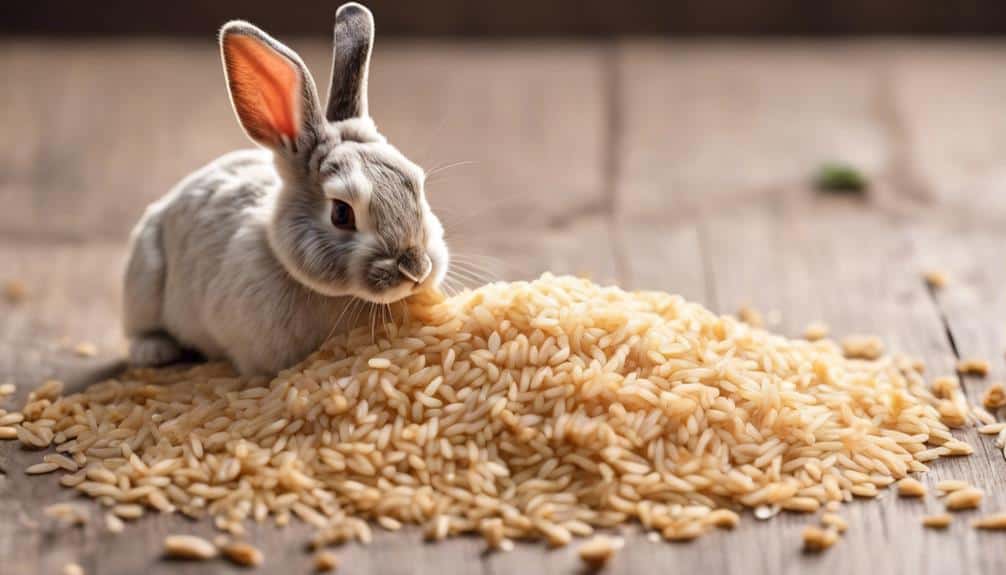
When considering snacks for your bunny, it's important to steer clear of offering raw rice due to potential digestive complications and lack of essential nutrients. Consuming raw rice can be harmful to your pet rabbit's delicate digestive system and lead to stomach swelling and discomfort.
Here are three reasons why raw rice shouldn't be included in your bunny's diet:
- Raw rice lacks the necessary fiber that pet rabbits need for healthy digestion.
- The consumption of raw rice can result in stomach issues and pose potential health risks to rabbits.
- Pet rabbits may struggle to digest raw rice properly, leading to digestive discomfort and possible complications.
It is important to prioritize your rabbit's well-being by avoiding raw rice as a snack and opting for safer, more nutritious alternatives to ensure their health and happiness. Remember, a healthy diet is key to keeping your furry friend thriving.
Frequently Asked Questions
Can a Rabbit Eat Cooked Rice?
You shouldn't feed rabbits cooked rice. It lacks essential nutrients, can cause digestive issues, and has high carbs, which are harmful. Opt for rabbit-friendly foods like hay, leafy greens, and veggies when cooking for bunnies.
What Food Can Bunnies Not Eat?
When it comes to what food bunnies should avoid, steer clear of toxic plants, dangerous vegetables, and harmful foods like chocolate. Stick to safe fruits and veggies to keep your furry friend healthy and happy.
Can Bunnies Eat Bread?
Yes, bunnies can eat bread in moderation. It can be used as a grain alternative, included in homemade treats, and is a way to provide variety in their diet. Guarantee a nutritional balance when offering bread.
Can Rabbits Eat Oatmeal?
Indulge your fluffy friend with a warm bowl of oatmeal. It offers variety in their diet and can be a comforting choice for sick or elderly rabbits. Remember, moderation is key, and watch for any tummy troubles.
Conclusion
To summarize, rabbits shouldn't eat rice due to its lack of nutritional value and potential digestive issues it can cause.
Surprisingly, white rice contains only 1.6 grams of fiber per cup, far below the recommended amount for a rabbit's diet.
Remember to prioritize foods high in fiber and nutrients for your rabbit's well-being and overall health.

